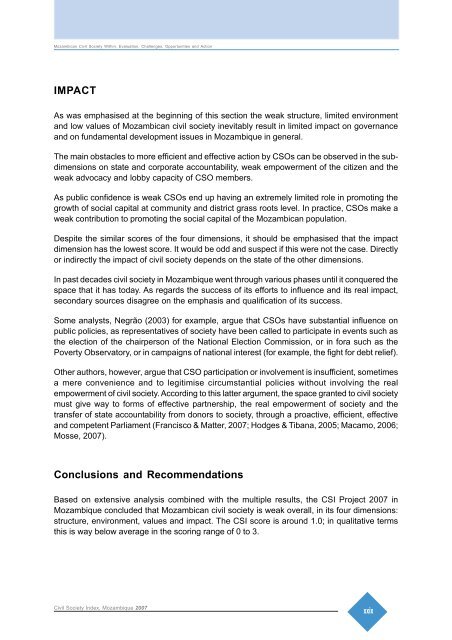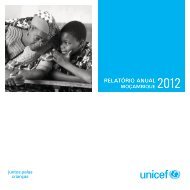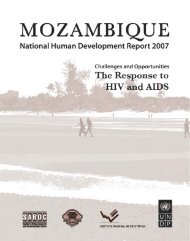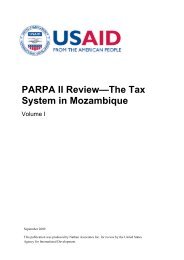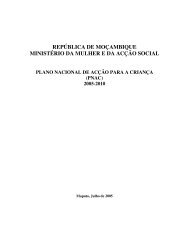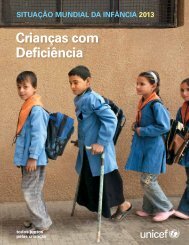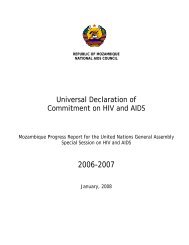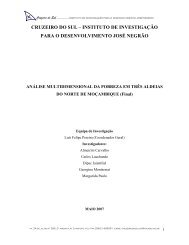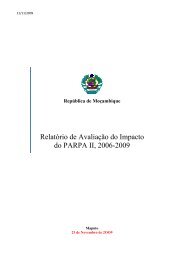Mozambican Civil Society Within: - UNICEF Mozambique - Home page
Mozambican Civil Society Within: - UNICEF Mozambique - Home page
Mozambican Civil Society Within: - UNICEF Mozambique - Home page
Create successful ePaper yourself
Turn your PDF publications into a flip-book with our unique Google optimized e-Paper software.
<strong>Mozambican</strong> <strong>Civil</strong> <strong>Society</strong> <strong>Within</strong>: Evaluation, Challenges, Opportunities and Action<br />
IMPACT<br />
As was emphasised at the beginning of this section the weak structure, limited environment<br />
and low values of <strong>Mozambican</strong> civil society inevitably result in limited impact on governance<br />
and on fundamental development issues in <strong>Mozambique</strong> in general.<br />
The main obstacles to more efficient and effective action by CSOs can be observed in the subdimensions<br />
on state and corporate accountability, weak empowerment of the citizen and the<br />
weak advocacy and lobby capacity of CSO members.<br />
As public confidence is weak CSOs end up having an extremely limited role in promoting the<br />
growth of social capital at community and district grass roots level. In practice, CSOs make a<br />
weak contribution to promoting the social capital of the <strong>Mozambican</strong> population.<br />
Despite the similar scores of the four dimensions, it should be emphasised that the impact<br />
dimension has the lowest score. It would be odd and suspect if this were not the case. Directly<br />
or indirectly the impact of civil society depends on the state of the other dimensions.<br />
In past decades civil society in <strong>Mozambique</strong> went through various phases until it conquered the<br />
space that it has today. As regards the success of its efforts to influence and its real impact,<br />
secondary sources disagree on the emphasis and qualification of its success.<br />
Some analysts, Negrão (2003) for example, argue that CSOs have substantial influence on<br />
public policies, as representatives of society have been called to participate in events such as<br />
the election of the chairperson of the National Election Commission, or in fora such as the<br />
Poverty Observatory, or in campaigns of national interest (for example, the fight for debt relief).<br />
Other authors, however, argue that CSO participation or involvement is insufficient, sometimes<br />
a mere convenience and to legitimise circumstantial policies without involving the real<br />
empowerment of civil society. According to this latter argument, the space granted to civil society<br />
must give way to forms of effective partnership, the real empowerment of society and the<br />
transfer of state accountability from donors to society, through a proactive, efficient, effective<br />
and competent Parliament (Francisco & Matter, 2007; Hodges & Tibana, 2005; Macamo, 2006;<br />
Mosse, 2007).<br />
Conclusions and Recommendations<br />
Based on extensive analysis combined with the multiple results, the CSI Project 2007 in<br />
<strong>Mozambique</strong> concluded that <strong>Mozambican</strong> civil society is weak overall, in its four dimensions:<br />
structure, environment, values and impact. The CSI score is around 1.0; in qualitative terms<br />
this is way below average in the scoring range of 0 to 3.<br />
<strong>Civil</strong> <strong>Society</strong> Index, <strong>Mozambique</strong> 2007<br />
xxix


